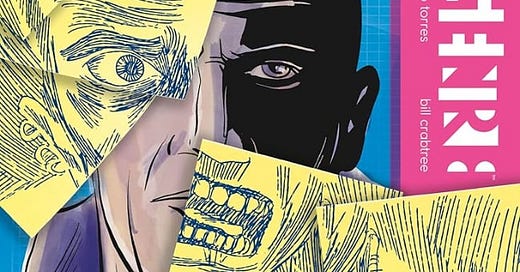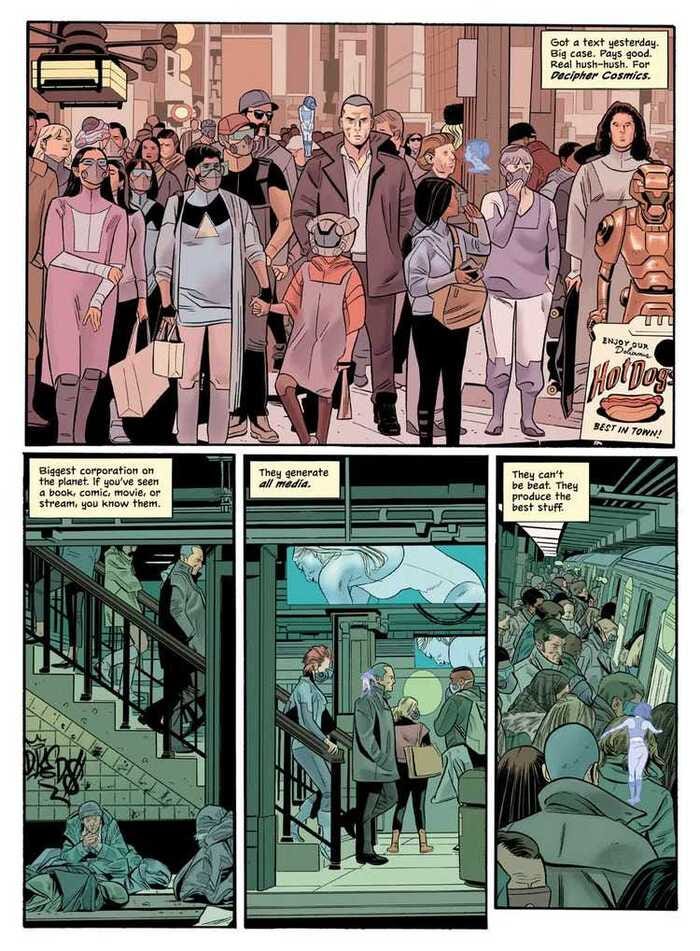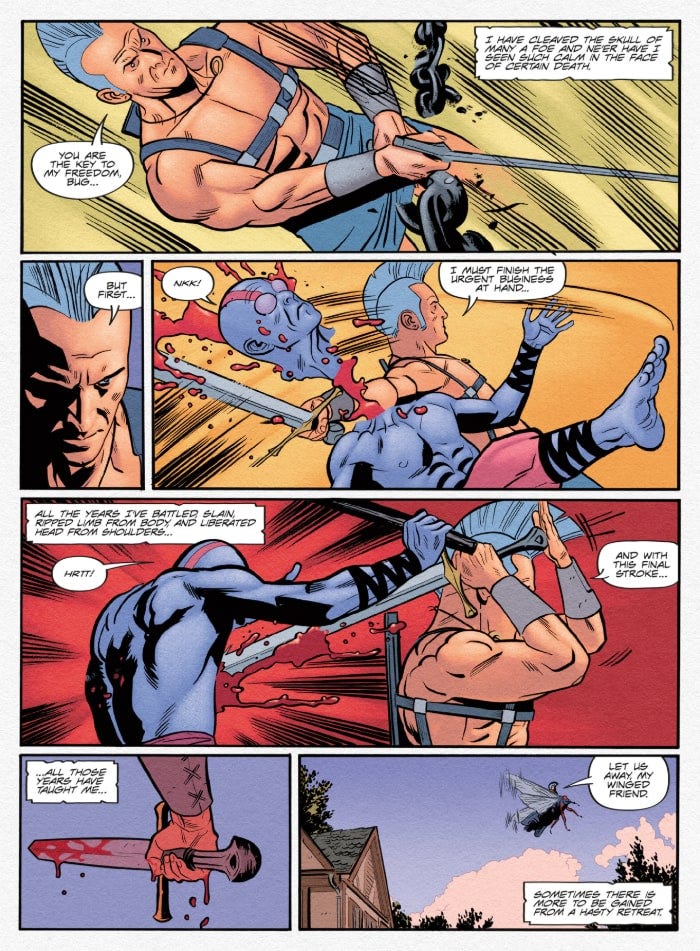Subgenre
Written by Matt Kindt
Art by Wilfredo Torres
Colors by Bill Crabtree
Lettering by Jim Campbell
Published by Dark Horse Comics, 2024
Buy it
Over the past several months, I’ve highlighted my love of metafictional stories in which characters realize that they are living in a fictional world, interact with their authors, or otherwise break out of the bounds of their realities. I didn’t mean to turn this into an obsession, but it seems that I can’t get away from this sort of thing, whether it involves the character Gwenpool interacting with the Marvel universe and developing fourth-wall-breaking into a superpower or the show Interior Chinatown taking a literal approach to its examination of the role that Asian people often play in TV shows and movies. I’m currently reading a novel that features characters entering a fictional world, and with Subgenre, I managed to find another comic that examines the nature of stories and the roles that characters play in them. I hope I’m not overdosing on these ideas to the point that they stop hitting home with me.
Matt Kindt has played with metafictional ideas a little bit in some of his previous comics, including Revolver, a story about a person who keeps shifting between multiple realities, and Mind MGMT, which followed a government agency that used mind control to affect people’s perceptions of reality. I haven’t kept up with his work as much as I should have in recent years, so it’s possible that I’ve missed something similar, but Subgenre seems to be Kindt’s most explicitly metafictional story, playing with ideas about the nature of fiction and the ways some may use it as an escape that’s not always healthy.
The story here follows Verge, a private detective in a somewhat dystopian future who is hired to investigate a murder that took place at the offices of Decipher Cosmics, a media company that has become an all-encompassing purveyor of fiction of every type, crowding out anyone else who may want to produce entertainment. His investigation leads him to a woman who is a collector of physical media and who has something of a vendetta against Decipher after learning that a novel they published that she found to be life-changing was actually generated by an AI program that had processed and reconfigured all of the world’s great literature. She also leads him to the IP Men, a shadowy cult of monks who practice martial arts and hoard old books.
This all makes for a fascinating setting, hinting that Kindt will touch on some of the ideas that are currently plaguing creative people in all industries as AI art and writing threaten to replace actual artists and writers and large corporations focus on gobbling up as much IP as possible and putting out endless variations on things that have been successful in the past. He also posits an interesting idea about how people in this future can use technology to control what they see, editing out anything that might be unpleasant to consider, like homeless people or garbage in the streets. That concept seems especially relevant, as more and more people in the real world only experience life through what they see on screens, often doing everything they can to avoid interacting with anyone or anything that conflicts with their viewpoints.
However, Kindt doesn’t dwell on any of these ideas for long, since he shakes things up by having Verge experience a break in his reality before waking up in a different world altogether. Here, he’s a barbarian known as Vee, and while he tends to go wherever his adventures take him, he ends up coming across a wizard who makes him question the very nature of his existence. Before long, he’s bouncing back and forth between realities and learning that he might be at the center of whatever metaphysical/metafictional mysteries he’s trying to uncover.
I’ll try to avoid discussing much more of the plot in detail, since the pleasure of a story like this comes from experiencing it and trying to piece together what exactly is going on. Kindt throws out lots of interesting ideas here, looking at the ways stories interact with each other and positing a sort of metafictional multiverse in which certain characters gain power by serving as archetypes who can leap from reality to reality, causing untold damage each time they do so.
But perhaps the most interesting aspect of this story is how Kindt weaves many of his other books into it. The books that cause Verge to experience his initial break from reality are all previous comics by Kindt, and later, we learn that different versions of Verge/Vee may have served as characters in several of these stories. While Wilfredo Torres provides most of the art in Subgenre, some of the glimpses we see of other realities consist of Kindt’s artwork, indicating that his oeuvre is what makes up the multiverse that this character jumps around in.
That makes some of the final revelations of this story seem very personal. Without going into too much detail, the story ends up being about someone who has become so lost in fiction that his real life has fallen to pieces. I hope that this isn’t a personal confession of Kindt’s, but is instead just a crazy idea for a story that he decided to give a bit more depth by referencing his past works. But even if he isn’t trying to draw a connection between himself and his character(s), he has come up with something fascinating here, a look at how an author’s body of work may involve repeated motifs and character types and what that may say about the types of stories they like to tell and the messages they are trying to convey.
Regardless of what Kindt’s ultimate goal is here, I can definitely appreciate the ambition. As much as I enjoy metafiction, I do prefer when it’s more than just a joke or a clever concept. I get the most out of it when it interrogates the ways stories are told, the ways audiences experience them, and the goals of authors. Kindt comes up with a lot of ideas in this fairly short book, and while he doesn’t fully explore all of them, he provokes plenty of thought, and that’s exactly what I want as I experience the thrill that comes from characters breaking through the boundaries that define their realities.






